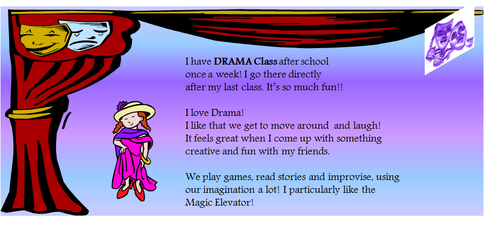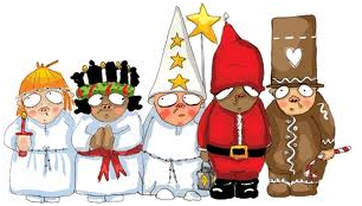"IMAGINATION IS EVERYTHING,
IT IS THE PREVIEW TO LIFE'S COMING ATTRACTIONS."
Albert Einstein
THE PROGRAM
Dramadish is a program of drama classes for children in schools. The class can
run as an after school program in the afternoon, or be included in the
curriculum. It all depends on what works best for the school. The wonderful
thing with having drama at your child's school is that it provides a safe space
that is well known to the children.
The age groups can be anything from 3 and up, as the curriculum will be created in accordance with the group; their age, group dynamic, personalities and development. The drama class is a living, breathing entity and is co-created by the participants as we go along, and therefore no standard syllabus will be given. The most important achievements are internal, rather than external.
run as an after school program in the afternoon, or be included in the
curriculum. It all depends on what works best for the school. The wonderful
thing with having drama at your child's school is that it provides a safe space
that is well known to the children.
The age groups can be anything from 3 and up, as the curriculum will be created in accordance with the group; their age, group dynamic, personalities and development. The drama class is a living, breathing entity and is co-created by the participants as we go along, and therefore no standard syllabus will be given. The most important achievements are internal, rather than external.
Drama Classes in Swedish
Currently Dramadish is a program for schools and are held in English. However,
there is also an idea to combine drama games with Swedish language learning.
There are many bilingual children in the tri-state area and drama classes in
Swedish would offer a fun and playful way to practise Swedish with other kids in
a natural way.
Since Swedish speaking children rarely are enrolled in the same school, a drama class could be carried out in a suitable location outside of school for those involved. If there is a group of at least 5-6 children of about the same age group expressing interest, then a class could be discussed. All children must speak some Swedish in order for the class to work, so some knowledge would be a prerequisite.
there is also an idea to combine drama games with Swedish language learning.
There are many bilingual children in the tri-state area and drama classes in
Swedish would offer a fun and playful way to practise Swedish with other kids in
a natural way.
Since Swedish speaking children rarely are enrolled in the same school, a drama class could be carried out in a suitable location outside of school for those involved. If there is a group of at least 5-6 children of about the same age group expressing interest, then a class could be discussed. All children must speak some Swedish in order for the class to work, so some knowledge would be a prerequisite.
If you are a group of parents interested in arranging this for your children,
please send an inquiry through the contact page.
please send an inquiry through the contact page.
PHILOSPHY
Although I'm a professional actor my foundation is in drama. This influences my philosophy in that when working with children I think it's important to focus more on who they are than to impress an outside audience. Drama means doing and is the foundation of all acting. However, there is a major difference between acting for the
theater and drama. In theater the focus is on a product, the end result. Drama
primarily focuses on the process, which allows for a relaxed atmosphere in which
the participants can enjoy and have fun while learning. Drama is not only for
the fearless extroverted kid who can do an audition in front of a panel of judges, but for everyone! Music, acting and movement are all part of drama.
BENEFITS
Drama inherently offers many benefits that allow its participants to discover things about themselves and grow as individuals. Introverted children usually slowly come out of their shell with continuous practice, and overall children and adults alike become more at ease being in front of people. The drama games require the students to work both individually and together, while the improvisations highlight body language and how our actions may affect others and ultimately leads to greater self-esteem and self-awareness. The skills practiced naturally while playing
drama games are for example: Listening, Focus, Team Work, Self-Expression, Creativity and Problem Solving.
In an increasingly technological society which offers less and less social interaction and obsesses over othe external, over scores and results rather than enjoying the journey, I believe drama to be of particular value. It can provide a sense of freedom of spirit and well being.
For information about the current class schedule at ARS, please see ARS page.

